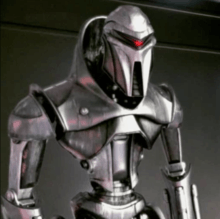Cylon (Battlestar Galactica)

The Cylons are a cybernetic civilization at war with the Twelve Colonies of humanity in the Battlestar Galactica science fiction franchise, in the original 1978 and 1980 series, the 2004 reimagining, as well as the spin-off prequel series, Caprica. In the 1978 series, Cylon is also the name of the reptilian race who created the robot Cylons.
The nature and origin of the Cylons differ greatly between the two Battlestar Galactica continuities. However, both series feature Cylon Raiders, Cylon Basestars and Cylon Centurions. The prequel series, Caprica, focuses on the creation of the Cylons, which differs from all the previous Battlestar Galactica series.
Original continuity
The Cylons of the 1978/1980 series are not the mechanical foils seen throughout the series, but an advanced reptilian race who created the robots (called Cylons within the show) to serve them, maintain their vast empire and to man their military forces in the face of a sudden population drop that eventually led to the Cylons' extinction — seemingly overnight. This fact is briefly mentioned in the 1978 movie-length premiere of the series (near the end of episode 2 in syndication) when Apollo relates the Cylons' origin to Boxey. In the episode "War of the Gods", during Count Iblis's private discourse with Count Baltar, Baltar (further explaining the reptilian Cylons' ultimate, apocalyptic fate as "having allowed themselves to be overcome (betrayed and, thus, completely killed off) by their own technology") mentions that he recognizes Iblis's voice, referring to Patrick Macnee's voicing of the Imperious Leader in the opening episode/theatrical movie (Macnee also played Iblis), with Iblis countering that if that was true it must have been "transcribed" over a thousand yahren (years) ago and programmed into the mechanical body of the Imperious Leader.
The follow-up series Galactica 1980 had a two-episode arc entitled "The Night the Cylons Landed" that featured a humanoid Cylon; though, unlike its successors in the post-millennial reimagining, it was not organic, but a complex mechanical construct.
In the original series, the Cylons, an aggressively expanding empire, declared war on Humanity because they had intervened on behalf of a race of beings called the Hasaris, who had been enslaved by the Cylons and who had sought the aid of the Colonials.
Reimagined continuity
The Cylons of the 2003 miniseries and 2004 Battlestar Galactica series are fundamentally different from the Cylons of the original 1978/1980 series. In the new version, the Cylons were created by humans as cybernetic workers and soldiers. As in the original series, the Cylons destroy almost the entire human civilization, chasing a few ship-borne survivors into deep space. Unlike the original series, however, the reimagined series includes 13 Cylon models that are nearly indistinguishable from human beings. Although these human-form Cylons are the focus of the series, alongside the humanoid models there are also Centurions similar to those in the original series. Much of the Cylons' technology is based heavily on bioengineering and/or synthetic biology rather than conventional robotics. Humans often derisively refer to Cylons as "toasters", due to the resemblance of the Cylon centurions from the first Human/Cylon war (the design of which is based on that of the centurions from the original series) to "walking chrome toasters", as described by Gaius Baltar in the miniseries. The humanoid models are referred to as "skin-jobs" (a term originally used in Blade Runner for the replicants) to differentiate the two variants.
Prior to the massive attack on the Colonies, the Cylon civilization was considered to be a major threat, but one which was contained. The interstellar military technologies of the humans and the Cylons were very comparable in capabilities such as instantaneous hyperspace jump, guided missiles, ship-based fighters, and nuclear weapons. In the premiere episode of the 2003 series, Commander Adama denies visiting reporters access to the Galactica if they carry networked computers, and reminds these reporters of the Cylon origins as networked Artificial Intelligence beings. In all aspects of computing and robotics, the Cylon technologies are far superior to those of humankind. Adama points out that, as long as the Cylons are kept out of the networks, humankind's superior numbers and the size of their industrial base gives them the tactical and strategic advantage. That is lost when Gaius Baltar allows the humanoid Cylon "Caprica Six" access to the Colonial defense mainframe. Her modifications to the defense code propagate throughout the fleet, effectively disarming it, and the massive attacks begin, resulting in the near extinction of humankind.
In contrast to the reason for the original Cylons' genocidal mission, religion is the primary motivation of the Cylon race in the re-imagined series. They consider humans to be sinful and flawed creations who, therefore, do not deserve to survive.
In the reimagined series universe, the term Cylon stands for Cybernetic Lifeform Node.
External links
| Wikimedia Commons has media related to Cylons. |